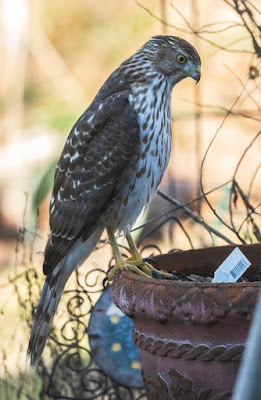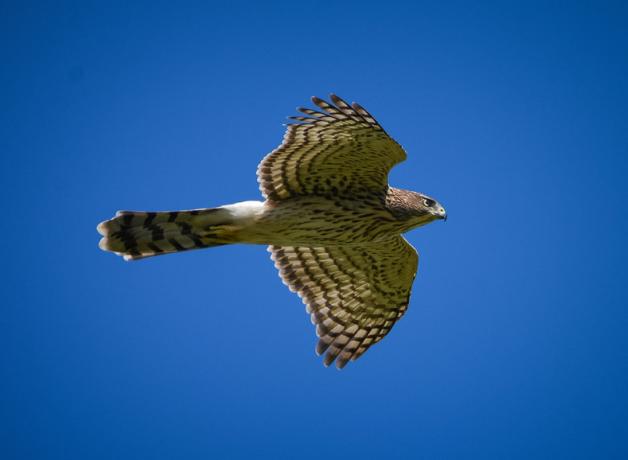 |
| Becky Swearingen |
In our last blog we discussed the virtues of native plants in an urban yard which attract a large variety of birds during winter. This apparently came to the notice of a Cooper's hawk that appeared soon after the blog was published. Here is where it flew off to a neighbor's tree above our yard to keep an eye on the feeders.
This hawk isn't here for the veggies. As a strict carnivore, it is looking for meat with feathers. Although they are commonly thought of as a bird specialist, they will also feast on rodents and other small mammals. Many other birds of prey dispatch their prey with their beaks. For example falcons tend to kill their prey by biting it. This hawk has a different method. A Cooper's hawk captures a bird with its feet, holding it in front of its body and kills it by repeated squeezing. They’ve even been known to drown their prey, holding a bird underwater until it stopped moving.

Jen Goellnitz CC-Becky
This video discusses their feeding techniques and the dangers faced when flying in among branches of trees. "In a study of more than 300 Cooper’s hawk skeletons, 23 percent showed old, healed-over fractures in the bones of the chest, especially of the furcula, or wishbone." Cornell Lab's All About Birds
 Initially Cooper's were birds in the wild but like we humans, they have become urbanized, likely giving up rural life for good hunting. In our open back yard, birds can see for a hundred feet in all directions so a hawk has clear sailing but a challenge to sneak up on a bird. They would be welcome to a few of the 30-40 starlings that descend on our feeders frequently, but they tend to flush in a confusing mass that even startles our guard dog Duke when I send him out after them.
Initially Cooper's were birds in the wild but like we humans, they have become urbanized, likely giving up rural life for good hunting. In our open back yard, birds can see for a hundred feet in all directions so a hawk has clear sailing but a challenge to sneak up on a bird. They would be welcome to a few of the 30-40 starlings that descend on our feeders frequently, but they tend to flush in a confusing mass that even startles our guard dog Duke when I send him out after them.
You can watch a Cooper's in action at feeders in a closed yard at this Youtube link.
Cornell Lab's All About Birds has a lot more details on the subject. Thanks also to Lisa Berger and Becky Swearingen.
